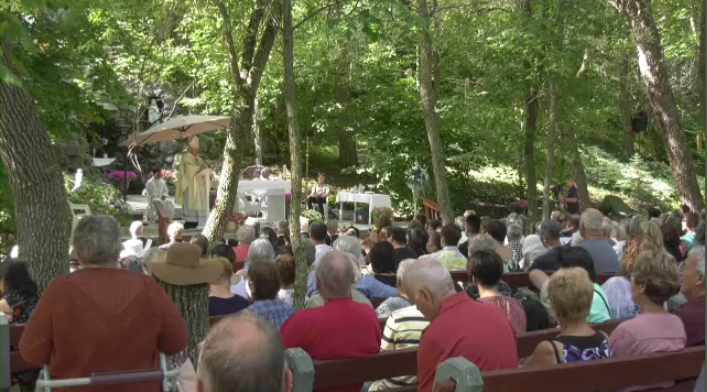Return of Manitoba Métis Federation's pilgrimage has special meaning following papal visit
 The Manitoba Métis Federation's annual pilgrimage to the Grotto of Notre Dame de Lourdes, located about an hour south of Winnipeg, took place on Sunday. (Source: Mason DePatie, CTV News)
The Manitoba Métis Federation's annual pilgrimage to the Grotto of Notre Dame de Lourdes, located about an hour south of Winnipeg, took place on Sunday. (Source: Mason DePatie, CTV News)
It's a yearly tradition taking place for the first time in two years.
The Manitoba Métis Federation's annual pilgrimage to the Grotto of Notre Dame de Lourdes, located about an hour south of Winnipeg, took place on Sunday.
The trip comes only a few weeks after Pope Francis issued a public apology for the role that the Catholic Church played in Canada's residential school system.
It's a fact not lost on Andrew Carrier, a residential school survivor and the MMF's Winnipeg region vice-president.
"The anger and the frustration have really bogged me down, and this is an opportunity to let go and to grow spiritually as well as a person," said Carrier.
During Sunday's mass, the MMF unveiled a new cross and statue of Jesus made in the holy land of Jordan -- a special item MMF President David Chartrand said required help from a close friend overseas.
"So he went about, and he said, for example, even the wood the trees they cut were in the river Jordan. They're exclusive. You can't go cut those. They are very protected," Chartrand explained.
In April, Chartrand met with the Pope in Rome and later accepted his apology when he came to Canada.
The MMF's leader said the community is now trying to move forward.
"I sent a message to all Indigenous people in Canada as a whole; let's all remember the Pope is leaving. He's only here for six days. After he leaves, it's up to us now. We need to take leadership. We need to be responsible," said Chartrand.
A major theme of Sunday's mass was reconciliation; a task Chartrand said gets closer with each event, like the pilgrimage.
"We're doing it ourselves. We're starting reconciliation," he said.
"You could see, as I said, a multicultural society altogether here, and so we're starting the process of healing, the process of moving forward, but the process of saying we don't have to give up our religion to believe."
It's a sentiment even echoed by those who have experienced abuse by the church in the past.
"Coming here to the pilgrimage among a variety of cultural groups who are believers in the catholic faith has brought us better together as a community," said Carrier.
CTVNews.ca Top Stories

LIVE UPDATES Tracking Hurricane Milton: Millions told to evacuate from worst storm 'in 100 years to hit Florida'
U.S. forecasters are warning of destructive waves, devastating winds and flash floods through the week as Hurricane Milton makes its way from the Yucatan Peninsula toward Florida.
Meteorologist becomes emotional giving update on Hurricane Milton
A seasoned American meteorologist became emotional on air as he gave an update on a major hurricane, later suggesting the reason behind his strong reaction.
One American physician's long journey to becoming a family doctor in Canada
An American family doctor is frustrated with what she says has been a challenging two-year-and-counting bureaucratic journey to be accepted into Canada.
'Extremely disappointed': Family of homicide victim storms out of courtroom as judge reads decision
Emotions boiled over after a judge acquitted two out of three defendants in a manslaughter case, while the third accused has since died.
WeightWatchers to offer compounded version of Wegovy weight-loss drug
WeightWatchers said on Tuesday it would offer a compounded version of Novo Nordisk's popular obesity drug Wegovy as part of its weight-management programs.
Is it safe to buy from Temu and Shein? Here's what Canada says it's doing to try to protect consumers
As U.S. regulators push for an investigation into what they call 'deadly baby and toddler products' from foreign e-commerce sites, health officials in Canada say they haven't determined whether any laws or regulations have been broken.
opinion Tom Mulcair: Pierre Poilievre's dramatic side could become his undoing
In his column for CTVNews.ca, former NDP leader Tom Mulcair argues that the dramatic side to Conservative Leader Pierre Poilievre, and his tendency to 'play everything to the hilt,' could well become his undoing.
8 million doses in 6 months: CBSA shares details of Australia-bound meth seizures
Border officers in B.C.'s Lower Mainland made more than 60 seizures of methamphetamine bound for Australia in a six-month span earlier this year, totalling more than eight million doses of the drug.
Baby Boomers are living longer than previous generations but have worse health, study finds
Baby Boomers may be expected to live longer than their predecessors, but a recent study has found that they are more likely to suffer from worse health than previous generations.

































